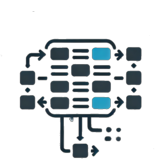GoMLX (for Go) port of Google Deepmind's Gemma GenAI/LLM model.
An implementation of Google DeepMind's Gemma model using GoMLX, a Machine Learning framework for Go.
It is very "fresh from the oven", so use it at your own risk. At the same time, I'm happy to help if you need any specific features, it's a good time for feature requests.
- Sampling / Generating: it provides the
samplers.Samplerobject to easily generate text. See example below, orcmd/gemma_demo/generator.gofor an example. - HuggingFace Weights Version:
- Download weights from HuggingFace, using provided AuthToken -- a read-only token will suffice.
- Kaggle Version
- Requires manually downloading weights from Kaggle.
- Use provided
cmd/convert_checkpoint.pyscript to convert Jax weights -- requires Python installation.
- A command-line demo
cmd/gemma_demo, with a simple Charm interface.
- Fine-tuning: the model is there, and it just needs some wiring together. But there is no sample code yet.
This is an example of how a Sampler object is created (for the simpler HuggingFace version) -- it requires the
HuggingFace token (read-only) used to download to be set in HF_TOKEN -- go to HuggingFace webpage to generate one for you.
package main
import (
...
hfd "github.com/gomlx/gemma/download/huggingface"
"github.com/gomlx/gemma/samplers"
"github.com/gomlx/gomlx/backends"
"github.com/gomlx/gomlx/ml/context"
_ "github.com/gomlx/gomlx/backends/xla"
)
var (
flagModelID = flag.String("model", "google/gemma-2-2b-it", "HuggingFace Gemma model id")
flagDataDir = flag.String("data", "~/work/gemma", "Directory to cache downloaded dataset files.")
)
func main() {
flag.Parse()
prompts := []string{
"What is 1+1 ?",
"What are the planets of the solar system?",
"```\n// BubbleSort is a Go function that sorts the Bubble Sort algorithm\nfunc BubbleSort[S ~[]E, E cmp.Ordered](x S) {\n",
}
ctx := context.New()
vocab, err := hfd.Download(ctx, *flagModelID, os.Getenv("HF_TOKEN"), path.Join(*flagDataDir, "huggingface"))
if err != nil {
log.Fatalf("%+v", err)
}
sampler, err := samplers.New(backends.New(), ctx, vocab, 1024)
if err != nil {
log.Fatalf("%+v", err)
}
start := time.Now()
output, err := sampler.Sample([]string{
"What is 1+1?",
"What are the planets of the solar system?",
// "// BubbleSort is a Go function that sorts the Bubble Sort algorithm\nfunc BubbleSort[S ~[]E, E cmp.Ordered](x S)",
})
if err != nil {
log.Fatalf("%+v", err)
}
fmt.Printf("\tElapsed time: %s\n", time.Since(start))
fmt.Printf("Generated text:\n%s\n", strings.Join(output, "\n\n"))
}- github.com/google-deepmind/gemma: Gemma is a family of open-weights Large Language Model (LLM) by Google DeepMind, based on Gemini research and technology.
 github.com/eliben/go-sentencepiece:
This is a pure Go implementation of encoding and decoding text with the SentencePiece tokenizer.
github.com/eliben/go-sentencepiece:
This is a pure Go implementation of encoding and decoding text with the SentencePiece tokenizer.
- Remove special symbols from sampling, like "<end_of_turn>".
- Fine-tuning demo.
- Benchmarking: how does it compare to Jax implementation ? Jax JIT-compile the main sampling loop during generation,
which could be done with GoMLX, but it would require implementing some new features. Not sure it is needed yet.
- At least in an old NVidia RTX 2080Ti, it works with GoMLX, and Jax reference implementation fails to sample, because it tries to JIT-compile the full sampling loop.
